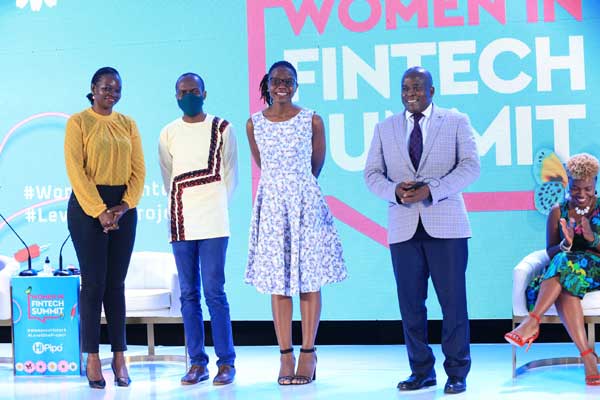Prime
Move to unlock women potential in Fintech gathers pace

What you need to know:
- Organised by HiPipo in partnership with Crosslake Technologies, Modusbox, Mojaloop, and Level One Project, the ceremony which culminated into the Women in Fintech summit, also saw the teams that made it into the top six rewarded with cash prizes in addition to further three months of training.
The week-long Women in Fintech Hackathon came to an end with Kuzimba Services, providers of engineering solutions being declared winners after shrugging off tough competition for the top prize.
Organised by HiPipo in partnership with Crosslake Technologies, Modusbox, Mojaloop, and Level One Project, the ceremony which culminated into the Women in Fintech summit, also saw the teams that made it into the top six rewarded with cash prizes in addition to further three months of training.
Kuzimba services, whose team leader is Eng. Ephrance Eunice Namugenyi won the top cash prize of Shs4million in addition to further three-month training in different aspects, including the business side of technology. They provide fast engineering solutions, making the purchase of building materials and transportation easy as well as providing access to building experts, carpenters, transportation means, architects, interior designers, cleaners and engineers.
“What was just an idea has turned out to be real and usable,” Eng Namugenyi told Daily Monitor in an interview after being declared the winner last week at the Women in Fintech summit in Kampala last week on Friday.
Although the organisers are looking at empowering women in the technology space, particularly in areas of developing innovative technologic solutions, there are still numerous barriers hindering women participation in Fintech and technology as a whole.
Discussing challenges and way forward, Founder and Author of Ideation Corner, Ms Damali Ssali noted that the cost of both internet and digital transaction remains way beyond what many women, including those in Micro, Small and Medium enterprises can afford. And this explains why only about 10 per cent of the money is being exchanged digitally in Uganda.
As for Ms Doreen Lukandwa, the Vice President of Global Enterprises, women need to be allowed to be revolutionaries as it is through this way that they can eventually develop innovations that empower them to be better across the economic sectors.
Offer support
“Our intentions and that of our partners is to ensure that the technological gender gap is closed,” Mr Innocent Kawooya, the HiPipo CEO said in an interview.
He continued: “We want to see more women in the digital innovation space, support them to not just understand but also innovate digitally. We will also continue working towards inclusive digital solutions as well as creating technologies that support and help populations at the bottom of the pyramid. Whether offering a product or a service, payment is made and this is why we need to make sure that we create an economy that helps people adapt to digital realms and related digital payments.”
The 16 teams largely composed of women, the majority of whom are below 30 years, were in the last few weeks introduced to new and emerging tools and technologies that are available to help them create inclusive and instant payment solutions that can ably serve the poor affordably.
“And that has been achieved greatly,” Mr Kawooya said.
Most of the solutions the teams provided were good prescriptions to real challenges afflicting sectors such as agriculture, education, payments, and remittances among others.
Utility
Fintech is a portmanteau of the terms “finance” and “technology” and refers to any business that uses technology to enhance or automate financial services and processes. The term encompasses a rapidly growing industry that serves the interests of both consumers and businesses in multiple ways.





